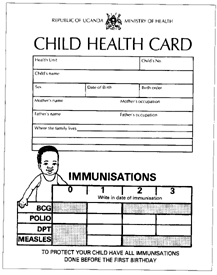

United Kingdom

| |
Immunisation and Health |
|||||||||||||||||||
|
|
|||||||||||||||||||
| The Scouts go round to the homes of young mothers in their villages and persuade them to get their children immunised against the diseases at local child health clinics. The Scouts accompany the mothers and their babies to the clinics, help to weigh the children, chat with the mums and return to the village with them after the nurses have given the babies their injections. They then repeat all this a month later as the children need to receive vaccinations two or three times for the immunisation to be effective. The clinics themselves are mobile ones and are often set up in village centres or primary schools. The nurses and health workers often travel many miles to the centres on bicycles with the vaccines kept safely chilled in a coolbox slung round their shoulders. The vaccines have to be kept cold because they become useless at room temperature, let alone the very hot daytime temperatures that one gets in East Africa. Keeping the vaccine cold all theway on its trip from Europe or America to the very remotest spot in Uganda is a complicated business and the Scouts have helped, too, to develop the 'cold chain' that allows this to happen. The mothers often need a great deal of reassurance from the Scouts that their children will be safe. There have been very scary stories about unclean needles being used and children contracting dangerous diseases instead of being immunised against them. The Scouts help to explain that all the needles used are sterilised before use and that the whole scheme is perfectly safe. Scouts who take part in this project, and have shown that they have understood what immunisation is all about, can earn their immunisation badge. It is not a cloth badge as these are too expensive for the Uganda Scouts Association to produce. Instead the badge is of the metal pin type, but it is worn by everyone who earns it with an immense amount of pride. Over three million lives are now being saved by immunisation programmes, but they are not nation-wide. Funding just doesn't exist to cover the whole country. Much of the money raised by the Unite project in 1994 will go towards helping to fund the immunisation project across the whole of Uganda. |
||||||||||||||||||||
Activity - Adopt a BabyWhen you have explained to the Beaver Scouts about the importance of immunisation, they may like to make a special immunisation card for a younger brother or sister, or perhaps for a new born baby in the community. If you don't feel confident about talking to the Beaver Scouts yourself, invite a local midwife or health visitor to visit the Colony. The boys and girls may remember having 'jabs' themselves. They are now old enough to begin to understand why they had to have them.Activity - Make a CardThe special Birthday immunisation Card will need to include an attractive and appropriate picture on the front. It will then need the details for immunisation inside it. If the Beaver Scouts were to 'adopt' a young mum in the same way as the Uganda Scouts do, they could keep the card and colour in the portions of it when each immunisation was undertaken. They could also follow the way in which a young baby grows in its first few months of life. Many Beaver Scouts may never have the opportunity to meet babies as they may be the baby of their family themselves! This could give them a very exciting opportunity to find out about the world around them. Invite a mum and her new born baby to visit the Colony for a short visit. This could be a younger brother or sister of one of the Beaver Scouts. Perhaps they could return every three to six months and the weight and length of the baby could be recorded. |
 |
|||||||||||||||||||
| This is the United Kingdon timetable for immunisation
|
||||||||||||||||||||
| |
home/resources/beaver scouts/Immunisation and Health